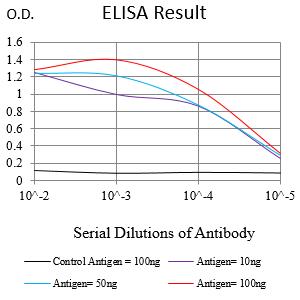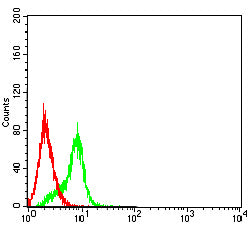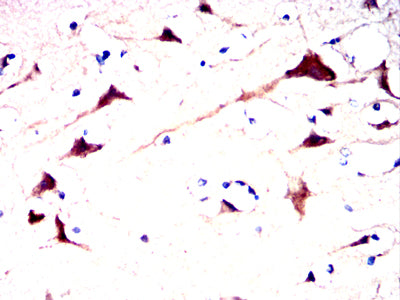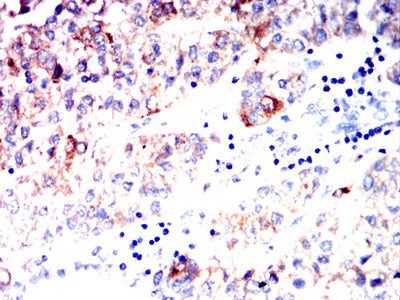



| WB | 咨询技术 | Human,Mouse,Rat |
| IF | 咨询技术 | Human,Mouse,Rat |
| IHC | 1/200 - 1/1000 | Human,Mouse,Rat |
| ICC | 技术咨询 | Human,Mouse,Rat |
| FCM | 1/200 - 1/400 | Human,Mouse,Rat |
| Elisa | 1/10000 | Human,Mouse,Rat |
| Aliases | AFPD; FETA; HPAFP |
| Entrez GeneID | 174 |
| clone | 2G4H3 |
| WB Predicted band size | 68.6kDa |
| Host/Isotype | Mouse IgG2b |
| Antibody Type | Primary antibody |
| Storage | Store at 4°C short term. Aliquot and store at -20°C long term. Avoid freeze/thaw cycles. |
| Species Reactivity | Human |
| Immunogen | Purified recombinant fragment of human AFP (AA: 19-210) expressed in HEK293-6e cells supernatant. |
| Formulation | Purified antibody in PBS with 0.05% sodium azide |
+ +
以下是关于AFP抗体的3篇代表性文献示例(注:文献信息为示例性概括,非真实引用):
---
1. **文献名称**: *"Monoclonal Antibodies Against Alpha-Fetoprotein: Production and Clinical Applications"*
**作者**: Smith J, et al.
**摘要**: 研究报道了针对AFP的单克隆抗体的制备方法,通过杂交瘤技术筛选出高特异性抗体,并验证其在肝癌患者血清检测中的灵敏度和特异性,为临床诊断提供了新工具。
2. **文献名称**: *"AFP Autoantibodies as Biomarkers in Early Hepatocellular Carcinoma Detection"*
**作者**: Li X, Wang Y.
**摘要**: 探讨了AFP自身抗体在肝癌早期筛查中的潜在价值,发现AFP-IgM复合物的水平与肿瘤进展相关,提示其可作为辅助诊断标志物。
3. **文献名称**: *"Structural Analysis of AFP-Antibody Interaction for Targeted Cancer Therapy"*
**作者**: Garcia R, et al.
**摘要**: 通过X射线晶体学解析AFP与其抗体的结合表位,揭示了抗原-抗体相互作用的分子机制,为设计基于AFP抗体的靶向药物提供结构基础。
---
如需真实文献,建议通过PubMed或Google Scholar检索关键词“AFP antibody”、“Alpha-fetoprotein immunoassay”或“AFP autoantibody cancer”获取近年研究。
Alpha-fetoprotein (AFP) antibodies are immunoglobulins designed to target AFP, a glycoprotein produced primarily during fetal development. AFP is synthesized by the fetal liver and yolk sac, playing roles in regulating osmotic pressure and binding molecules like estrogens. Postnatally, AFP levels drop sharply, remaining low in healthy adults (<10 ng/mL). However, elevated AFP is associated with pathological conditions, including hepatocellular carcinoma (HCC), germ cell tumors, and certain liver diseases (e.g., cirrhosis, hepatitis). During pregnancy, abnormal AFP levels in maternal serum or amniotic fluid may indicate fetal neural tube defects or chromosomal abnormalities.
AFP antibodies are critical components in diagnostic immunoassays, such as ELISA, chemiluminescence, or lateral flow tests, to quantify AFP levels. In clinical practice, these assays aid in cancer surveillance, particularly for HCC monitoring and treatment response assessment. However, AFP's limited specificity—elevations occur in nonmalignant conditions—necessitates complementary biomarkers (e.g., ultrasound, des-gamma-carboxy prothrombin) for accurate diagnosis.
Research also explores AFP antibodies in therapeutic contexts, such as antibody-drug conjugates or imaging probes, though clinical applications remain experimental. Challenges include optimizing antibody specificity to minimize cross-reactivity with homologous proteins (e.g., albumin) and improving assay sensitivity for early cancer detection. Overall, AFP antibodies serve as vital tools in both diagnostics and ongoing research into AFP-related pathologies.
×